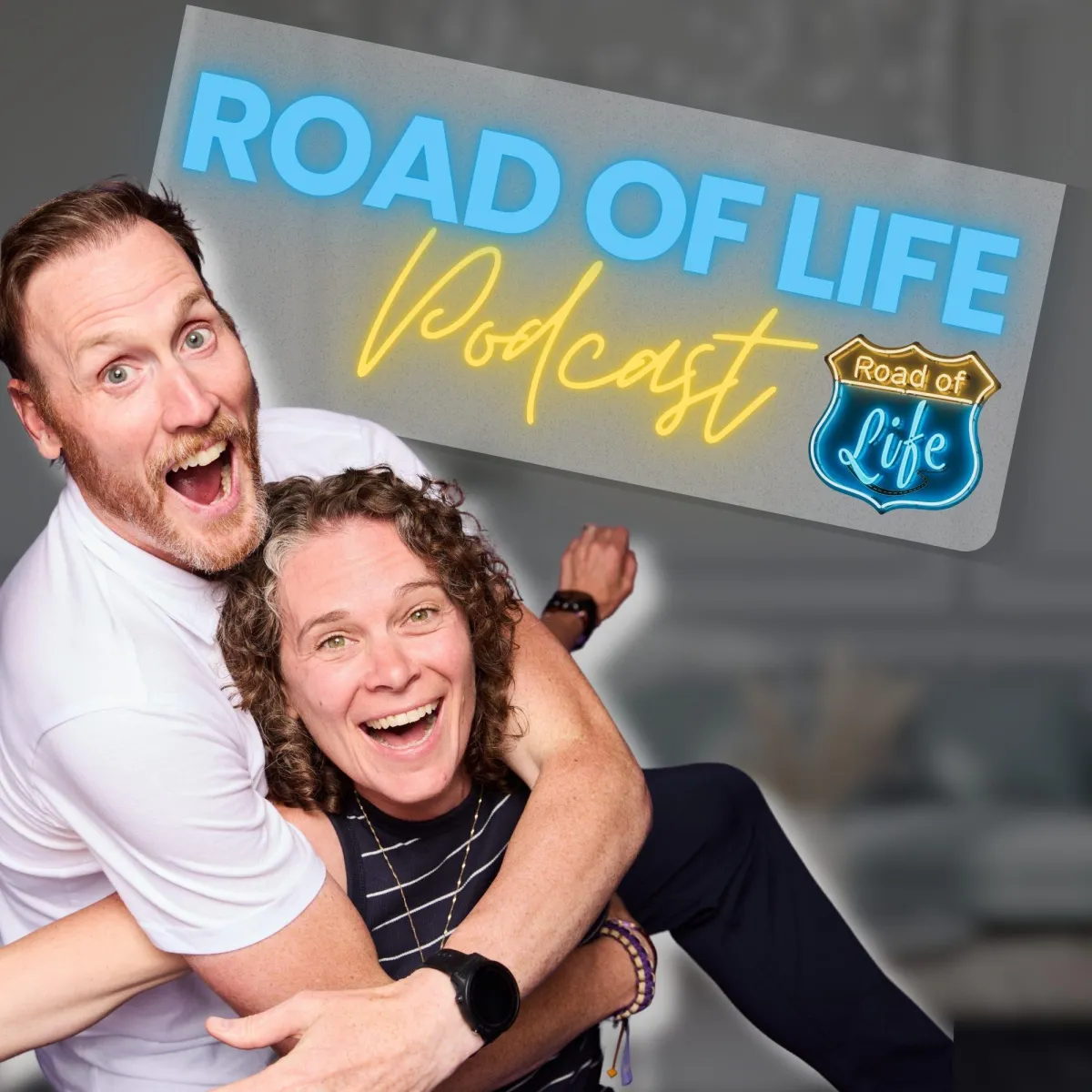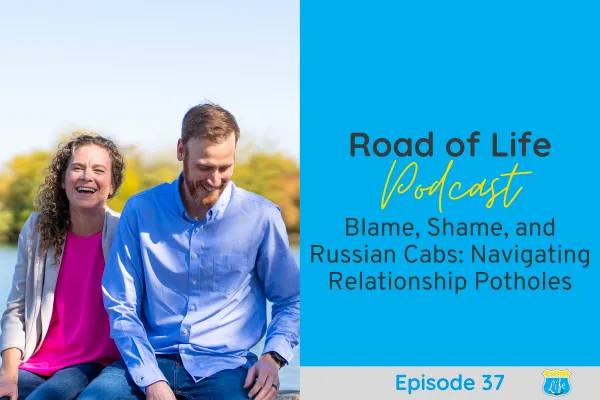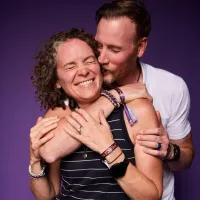
The
Road of Life
Podcast
With Meredith MacKay & Craig Bennett
Listen

37. Blame, Shame, and Russian Cabs: Navigating Relationship Potholes
37: Blame, Shame, and Russian Cabs: Navigating Relationship Potholes
Listen Now
Episode Transcription
Welcome back to the Road of Life podcast with MacKay and Bennett.
This week we're talking about the blame game.
We're telling a story.
Russian cab story.
We went to Russia back in 2018. This was fun. Yeah, it was a great trip.
A fantastic trip.
We learned a lot of lessons.
Saw a lot of crazy stuff.
Yeah, Russia's an interesting place.
It's a trip, man, for sure.
Absolutely. Probably even more so now. I don't even know, but wild.
True. I'm glad we went when we did.
Yeah, 100%.
Not in a hurry to get back.
No. No.
We've got lots of stories we could tell about Russia for sure, about how you almost got hit by a car and we almost died in the cab multiple times.
Street brawls, fires, spent the day in a Russian, what is it? A political building? Government building. Yeah.
Yeah. It was an interesting trip, but there's one story in particular we wanted to tell because we think it offered us some really helpful lessons that we wanted to pass along. The story of how I left my phone and my credit card and my driver's license in a Russian cab at the airport.
We were leaving Moscow to go to Sochi and we had spent a week in Moscow and the better part of that week was incredibly stressful because there was a whole, you know, other situation going on that we were trying to address that was really stressful. And we finally got that situation sorted out on the last day.
Just before we went to the airport, like, ha, deep sigh of relief. Like we can finally start enjoying this trip and we get to the airport, we get through Russian security, which is about as fun as you'd expect it to be. Yep.
When you picture Russian security and going through an airport, whatever you envision.
Yep. That's it.
It's pretty much it. And we have a little bit of time, but not a lot of time. We wanted to grab a bite to eat. Food hadn't been great. I don't
think Russia is known for its food. If it even arrives at your table.
Yeah. We had some
experiences.
We decided we were going to see if there was a McDonald's in this airport.
You know what you're going to get with McDonald's. It may not be great, but at least you're going to get it. It's consistent. Yeah. You know what you're getting.
I went to grab my phone to It's, you know, Google Maps, where's the nearest McDonald's? And my heart sank. The phone was not where I thought it was going to be.
And in that like instant, I knew I didn't have it.
But I've never seen anyone pat themselves so fast and in so many places. Pocket or no pocket, it didn't matter. Like that, that, that like. Yeah. Like.
Fraction of a second pat down. I dug through my bag really quickly. I just, I knew, I just knew it wasn't there.
And the feeling of sheer panic that I experienced... Everyone's had that feeling, you know, your heart just drops, your throat just tight. It was just like, Oh my God, what have I done? And my phone, I don't, I don't have my phone. And it took you a second. Believe me.
Because from my perspective, it's like, come on, you can't be serious right now.
We're in a foreign country. You did not leave your phone credit card and driver's license. You did not lose that somewhere. And like you have one job, make sure you take you and all your stuff with you when you leave the cab, when you leave anywhere. We didn't know where it was at this point.
Yeah.
That's right.
And so we actually circled back.
Yeah. So we get through Russian security, which we, we already talked about being the most pleasant experience. And voluntarily go back into that, that den and start trying to communicate with these officers about our situation.
Like we've lost the phone. We're wondering if it's here. They don't speak English. We don't speak Russian. And they're probably, I don't know, starting to get a little agitated. Like, who are these people? What do they want? Why are they so like, Panicked and elevated. Yeah, like this is not like should we get our taser out or like our baton or do we need to shoot?
Do we need to shoot these people? Like what what's going on here?
So we ended up just backing away slowly.
We were just like, I don't know. This just seems like a bad situation. We're not getting anywhere here. Let's exit stage laughter.
So we did. And that's when we had the brilliant idea of calling the phone.
Yeah.
Like what, why it took that long to figure out, like why don't we just call the phone?
Emotions are running high. Like Sharon Lechter says, high emotion, low intelligence.
But we eventually did get there. So we make the phone call and the cab driver they speak Russian. We speak English. That's a problem, obviously. So we have to scramble and find someone to help us translate. So we're running through the airport saying, do you speak English and Russian and all these people thought we were crazy in this airport.
But we found someone who was helpful and talked on the phone to the cab driver and translated for us.
And we eventually realized that The cabbie is on his way back to Moscow, which is over an hour's drive away, with another fare, and so he can't just turn around and bring the phone back to us. So it's going to be at least a couple of hours before he can get the phone back to us.
And we don't have a couple of hours because our flight is leaving, obviously. However, we are coming back through this airport in four days after Sochi, on our way somewhere else. And so the cab driver says he will either bring the phone to Lost and Found at that airport and leave it there for four days, or he can bring it back to us on the same day that we will be traveling back through this airport.
We take door number two, because I'm not super keen for my phone, my credit card, and my driver's license to be sitting in a box in Lost and Found in this airport for the better part of a week. We let the cabbie know that, you know, thank you very much. We'll take option number two and we'll obviously pay you the fare to and from the airport.
To make you whole, to make you whole, compensate for your time. Yeah. And so we go to Sochi. I have no phone, but that's okay. We know we're getting it back in four days. Sochi was great and we're leaving Sochi and as per the plan, you text the cabbie, using a combination of WhatsApp and Google translate.
It's not the easiest thing, but you, you text the cabbie, remind him when we're landing and that we'll see him there and blah, blah, blah. And then turn off the phone and we, you know, take off. And when we land, we learned that the cabbie is not coming. He ends up calling us. We do the whole same dance in that same airport, trying to find someone else to translate, which we do find.
People are lovely and they're willing to help. And he lets the woman know that no, no, I'm not coming to the airport. They can come to a train station in Moscow and meet me and exchange money for a phone. And we were like, hmm, that's not the plan. I'm not, I'm not keen on that. Seems like he's holding my phone hostage.
And so we declined that option. And that's when we have our second brilliant idea. Which was to go around the cabbie to the actual cab company. Let's just see if we can reach the company somewhere. Cause we booked the cab on an app, so we went through the app. got the customer service, sent the company a message.
You were back and forth with them for a little bit. They're like, yeah, leave it with us. We'll see what we can do. And within a day or two, they let us know they had the phone. Where would we like it sent? We had them send it to our St. Petersburg hotel that we would be getting at in a few days. When we get to our St. Petersburg hotel and we're checking in, it's like, does there happen to be a package here for us? And I am crossing my fingers, my toes, my like, everything I can cross I am crossing. Hoping beyond hope that there is a package there for us. And sure enough, he brings it out and we get a dead phone with a credit card and a driver's license still in the back. A little leather bound notebook and a thank you card that says thank you for your trust.
Yeah. Crazy. We didn't have a lot of choice in the matter, but it was nice to, you know, receive that.
Yeah.
Best possible outcome in the end, I mean, it took a week and a half, Got the phone and, you know, the credit card, the driver's license, we got it all back. Yeah. No harm, no foul in the end. Except you had to be on picture duty for the better part of that trip.
Yeah, so there's not as many pictures.
Hehehe, fair enough.
That's the price we paid there.
Yeah, but overall, best possible outcome, and the more we thought about that experience, we attributed that best possible outcome to two things that we did in those moments of panic, and throughout the week and a half escapade.
And the first one was that we did not play the blame game. When I said I don't have my phone and we realized eventually the phone was in the cab. I eff'd that up. It would have been really easy for you. It would have been really easy for you to be like, what the hell, how could you possibly do that?
What's wrong with you? Blah blah blah blah, and assign blame because, I mean, there was only one place the blame could go. So it would be very easy for you to pile on. I was already feeling terrible. It would have been quite easy for you to just pile onto that and make me feel worse.
Yeah, it would have been easy.
And I'm not, I'm not gonna lie, it, it takes some, Intentionality in that moment, cause it was frustrating and we're in a foreign country and now you've lost a phone with your credit card and driver's license. And it's like, Oh my God, no, you didn't. And so, yeah, in that moment it was like, blaming you isn't going to help the situation in any way.
I know you already feel bad about it. I know that this is a problem that we now have and we just need to get to fixing it and solving it. And by taking any other approach and blaming and piling on is going to get us further away from that goal. Not closer. It's going to make things so much worse.
So just don't go there. Not that it's always easy in that moment because it's like frustration is high for sure. Yeah. I'm a human being. And like all human beings, we sometimes get emotional and it's a reactionary thing. But if we can take a second And train ourselves in those moments to take that second, breathe.
Where are we? What do we need? What, what are we trying to accomplish and then just start to craft a plan to figure out how we're going to get to that goal. It's all about the end goal. What's the end goal is the end goal to make things worse, pile on and, and be right and be righteous and, and. put you down and me up.
No, that's not the goal here. The goal is to as a team figure out we've got ourselves into a situation. How do we get ourselves out of it? Focus on solutions, not problem. And you will then start figuring out how to solve the problem and you'll get, get to the solution a lot quicker.
Which is the, where you just finished is the second thing that we realized that we did.
We didn't stay trapped in the stress, the emotion, the frustration of the problem.
Correct.
We focused on how are we going to solve the problem.
Yeah.
Two heads better than one, we work together to figure out, focus on the solution, because what you focus on you get more of.
Yeah, I think it's important early on to really understand the problem. Okay. What is the problem? And that's where you put your focus for a second so that you understand what you're dealing with. But then you have to quickly move over to, okay, that's the problem. How are we solving it? What's the solution? I'm putting the 99 percent of your focus there.
The blame game is really common. There's a little bit of innate humanness in it, in us, that we never want to feel bad. We never want to be wrong. And I think that some of that comes from our own self worth and where we fall on that spectrum of high self worth to low self worth.
And the lower we are in that spectrum, the less comfortable we are being wrong and taking accountability and the more likely we are to assign blame to make sure that That's not this isn't on me. I didn't do anything wrong. We assign blame to someone else to make sure they know that they are wrong and I am not. You put someone else down so that you feel a little bit better because inside of you, you don't feel good enough as you are, so it helps to put someone else down to make you feel like you are good enough because you're not the one who made the mistake. There's a connection between your level of self worth and your willingness to assign blame.
Yeah. you made a point of the blame game is very common, and in society we are rampant with a sense of unworthiness and there is a correlation. I think that The fact that there's so many people that do the blame game or or at least default to that is really a Function of their worthiness and their, their own sense of self worth.
And bringing, bringing themselves up. A lot of times people will bring themselves up and in order to do that, they bring other, they bring other people down.
It's just another manifestation of scorekeeping. Keeping score in your relationship is the fastest way to breed resentment and disconnection.
Yeah.
And this is another way of keeping score.
For sure.
Because I was right.
You were wrong. This was on you. This was not me.
Yeah.
Remember that time when we did this? You did that. Mm hmm. No, like it's And because the other,
the flip side of that is, as humans, we all make mistakes.
Oh, my time will come. My time has come. Right. Many times. And it will come again. And do I want to be... do I want to face someone who reacts in a way that puts me down and blames me and makes me feel worse about it? Or do I want to, face it with someone who's going to help me figure it out and solve the problem?
Yeah. Because, you know, if you had piled on and made me feel worse and assigned blame and: look what you did. How could you do this? Chances are you might want to do the same thing that I do. Yeah. That's, that's the environment we're creating for our relationship. And so then the next time that you leave your, I don't know, jacket with your wallets in it in a hotel room in middle of nowhere, Northern Ontario, and we drive two hours to get gas before we notice it's gone and they have to turn around and drive back. Do we wanna have the relationship where we are piling on and assigning blame?
I know you felt bad in that moment. What was it going to do...
how could you tell?
He didn't say one word in the four hour total drive.
Oh my God. I was so mad at myself for leaving that wallet. It was sucked. We were two hours out of the way, two hours, road trip. Oh, awful.
Point being that we're, we're each going to do it. We're each going to have those moments. Everyone's going to have those moments. So have some empathy for the person who's done it.
You know, they feel bad enough. You pointing out what they've done does not make it any clearer to them. They already know. You want to have the relationship where you are empathetic and supportive and you're not piling on for your partner so that they don't feel worse. I don't want you to feel worse than you already feel.
And also so that next time it happens, cause you're going to be the one that does it, that you don't feel like it's, it's, it just piles on. And so, yeah, it's just nipping that in the bud right now. Just focus on the solutions, figure out where you guys want to be and work together to get there and attack it.
Long story short: don't assign blame. Don't pile on and focus on solutions instead of problems. And have empathy and always have empathy.
Couldn't have said it better myself, MacKay.
If you loved this episode, we would be really honored if you shared this episode with a friend who might also love this episode. And we will see you next week.
Bye.
Bye.

Meet
Meredith & Craig
Life partners, business partners, and best friends. We left the corporate grind to become fulltime entrepreneurs... with no idea what we were doing.
That made for some interesting, amazing, stressful, awesome, painful, scary, awful, awesome, insightful, unbelievable decisions, moments, experiences, relationships, and quite honestly, we wouldn’t have it any other way.
Our marriage is the foundation for everything else we build in our lives. It is a cheat code for life, and we believe that having that part dialed in levels up every other part of life.
We help others live their dream life... and that starts with a rock solid relationship so they can level up the rest of their lives too.
Tune in for a dose of laughter, love, a gentle ass kicking, and game-changing wisdom that will help you unleash your potential and build the life of your dreams together.









